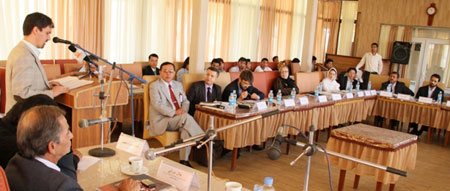CSHRO Strategic Seminar conducted
By: Wazir Ahmad Khorami On March 12 th the strategic seminar of CSHRO was conducted in Kabul city, during the seminar representatives of member organizations together with the CSHRO secretariat discussed how to bring strategic changes into future activities of the Network. The strategic seminar was facilitated by Mr. Francesco Paolo Simone Castellani, adviser at the Danish Institute of Human Rights. At the beginning of the seminar Mr. Malek Sitez, Head of CSHRO's programs in Afghanistan, explained the importance of strategic planning and regularly updating of CSHRO's strategy to the participants. The aim of updating the strategy is to involve and include all member organizations into the CSHRO activities. The participants of the strategic seminar discussed the current strategy in comparison with the current situation in Afghanistan . The participants of the seminar were divided in four working groups where each working group discussed the issues of the key result areas of the strategy (capacity building, coordination and advocacy). During a one hour discussion, participants of the seminar discussed the main challenges of CSHRO in the field of coordination, capacity building and advocacy. The representatives of the working groups presented their ideas about the key result areas on behalf of their working group. The results of the working group discussion are very useful and constructive for future activities of CSHRO. As a result or the discussion two additional key result areas were proposed to be included in the strategy of CSHRO, these were “Public awareness” and “Monitoring”. Participants of the seminar agreed on collaboration of the member organizations in the field of monitoring the human rights situation as well as the dissemination of information on human rights issues to the people of Afghanistan. Participants of the seminar strongly advised CSHRO to focus on monitoring the human rights situation…
